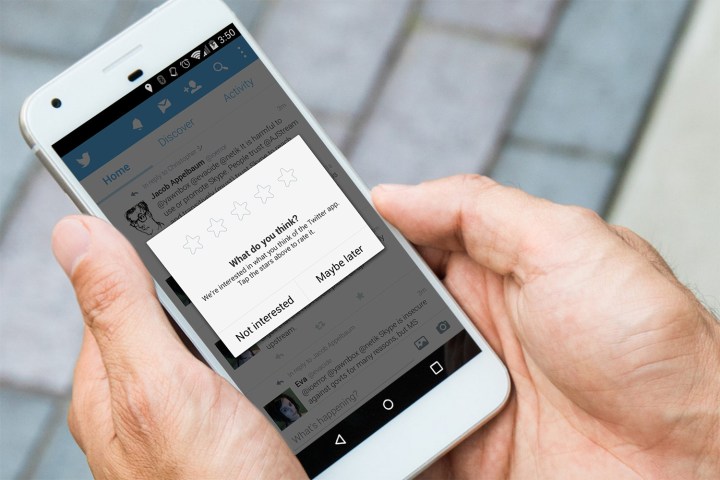
As smartphones have soared in popularity, app development has exploded. There are currently more than 3.5 million Android apps and games in Google’s Play Store, and more than 2 million apps and games in Apple’s App Store, according to App Annie. With such a feast of choice, people need a little help separating the wheat from the chaff.
App stores offer a review rating system for precisely this purpose. After you download and install an app, you can rate it out of five stars and write up a review detailing your thoughts. Review scores are aggregated and used to determine an overall score for the app. The higher the score an app gets, the more people liked it, at least in theory. In practice, a lot of reviews are less than useful for prospective installers and there’s a thriving trade in fake reviews. One star, one-line reviews complaining that an app didn’t work on this or that device, or that there was some billing issue, aren’t always a good indication of whether the app will meet your needs. But what about multiple five-star ratings with repetitive, unnatural-sounding reviews?
Gaming the system
Good review scores are vital if you want a coveted place in the app store charts. They boost your chances of appearing on curated lists and recommendations, and the bottom line is they can persuade people to install your app. Little wonder then, that some developers are willing to bend, or even break, app store rules to get closer to five stars.
The fact that many developers game the system has been an open secret in the industry for years.
“While we haven’t performed any specific analysis to quantify the scale of the problem, fake reviews do exist and have been shown to materially affect app review scores,” Paul Barnes, regional director at App Annie, told Digital Trends.
The fact that many developers game the system has been an open secret in the industry for years. A brief web search for “paid app reviews” or similar terms reveals several services selling app reviews and installations to artificially boost the standing of apps in the main app stores. While a small number of app reviews might cost $2 to $3 each, developers buying in bulk can secure discounts, with reviews costing below a mere 50 cents.
There’s no gray area here – this practice violates the Google Play Developer Program Policies and Apple’s App Store Review Guidelines. It can result in the removal of suspect reviews, the removal of the app, or even the expulsion of the developer from the program.
“Both Apple and Google have demonstrated they take the issue extremely seriously, and they continuously monitor reviews left on their respective stores,” Barnes said.

The problem is that determining what constitutes a fake review is easier said than done. Many of these services employ real users who download and install the apps and then post glowing reviews. While developers used to buy reviews in big chunks and post suspiciously similar write ups, things have gotten more sophisticated.
You can now dictate the wording of reviews, decide on post frequency, and stir in some four-star reviews alongside the five-star reviews to make it look more natural. Some of these paid app review services also guarantee they will replace any reviews that are deleted.
“We want ratings and reviews to be authentic and a true reflection of comments from the users.”
“We want ratings and reviews to be authentic and a true reflection of comments from the users,” Andrew Ahn, product manager at Google Play, told Digital Trends. “Spammy reviews, such as off-topic comments, solicitation, content with profanity, are just some of the categories we filter out. We also prohibit fake or incentivized reviews.”
Interestingly, the practice of buying reviews isn’t just about securing positive feedback for your own app — it can also be used to knock the competition down.
“There are two types of issues with incentivized reviews,” Ahn said. “One is buying good reviews to better promote your own app, and the other is buying negative reviews to harm competing apps. We cover both cases to keep the ecosystem clean and fair.”
Meteoric success, like what happened with the game Flappy Bird, immediately raises questions, as does a sudden drop in ratings, like with CNN’s iOS app.

In July 2017, CNN’s iOS app was “review bombed,” meaning the app store was flooded with malicious reviews over the course of a single week. It went from receiving around 30 reviews a day total, to receiving thousands of negative reviews between July 5 and July 11.
“It’s unclear if this was caused by automated bots or a coordinated approach from a politically-motivated group that opposes the network,” Barnes said.
Even when suspicious reviews are flagged, it seems that developer expulsions and app takedowns are relatively rare. If the manipulation isn’t blatant, it’s easy to imagine how difficult it might be to prove wrong doing on the part of a developer.
“We are able to filter out most incentivized reviews, so it does not impact the placement or presentation of an app in a meaningful way,” Ahn said. “In some egregious cases, we may take down the app for violating the Google Play Developer Program Policies.”
If you’re having trouble trusting app store ratings, we don’t blame you.
Quietly removing suspect reviews and giving developers a slap on the wrist is an understandable approach; Google and Apple don’t want to alienate app developers or deal with them too harshly.
The saga of an app called Dash and its removal from the App Store is an interesting, and rare example of an ejection that turned into a public argument. It’s tough to know the truth of the matter in a case like that. Apple claimed the developer paid for reviews, and the developer stated it was his relative’s account that was tied to his credit card, which in turn was also tied to his own account. Other apps, like One Night Stand: Adult Hook up, which is discussed in greater detail on Reddit and is still available in the App Store with a rating of 4.9 out of 5, seem to be clearly breaking the rules with impunity.
While developers buying fake reviews can be difficult to detect, there is a much clearer incentivization strategy we’ve seen in a few apps and games over the years. Sometimes you’ll be offered a free in-app purchase or some in-game currency in return for a positive review. If the developer explicitly asks for a five-star review, then this breaks the same guidelines as buying fake reviews, but there’s some wiggle room here.
It’s common for apps and games to ask for reviews via a pop-up after you’ve been using the app or playing the game for a while. These pop-ups may repeat every so often until you go ahead and leave a review. Someone came up with the bright idea of sending users who gave a positive score to the normal app store review page but diverting users who gave a low score — often anything less than five stars – to their own website to leave feedback. This is a loophole that doesn’t seem to be breaking any rules right now, but we know it’s on Google’s radar.
There are no statistics on how many apps are removed from app stores because of incentivized reviews, but Google removed more than 700,000 “bad apps” last year alone. The majority were copycats, contained inappropriate content, or were considered potentially harmful malware, but the fake review issue is also being treated seriously.
Android developers looking to challenge suspicious reviews can do it from the Play Console. This will bring the attention of a specialist, who will decide whether the review violates posting policy and needs to be removed or not. The rest of us can use this form to report Play Store reviews as inappropriate or spam, or you can go to the review, tap the three-dot icon, and hit Spam. You can also go to the very bottom of the app listing and hit Flag as inappropriate if you notice fake reviews.
For anyone that uses Amazon’s Appstore, there’s another tool at your disposal. It may only have around 600,000 apps and games to choose from, but because Amazon has had issues with fake reviews on other kinds of products for years now, there’s an independently-developed review analyzer tool called ReviewMeta that also works for apps. Paste the link into the tool and it provides a simple pass or fail by analyzing the public data to look for things like repetitive phrases or suspicious one review accounts with unverified purchases. It’s not perfect, but it’s interesting to try out and see a clear methodology for rooting out fake reviews.
For Apple’s App Store, the best way to report fake reviews is to contact iTunes support.
If you’re having trouble trusting app store ratings, we don’t blame you. We would like to see all the major players take more action to combat fake reviews. Luckily, there are plenty of trustworthy websites out there that review apps and games, and you can always dig into our curated lists of the best Android apps, best iOS apps, and our weekly App Attack column.
Editors' Recommendations
- Everything you need to know about the massive Apple App Store outage
- Does tracking your sleep actually help you sleep better? We asked an expert


